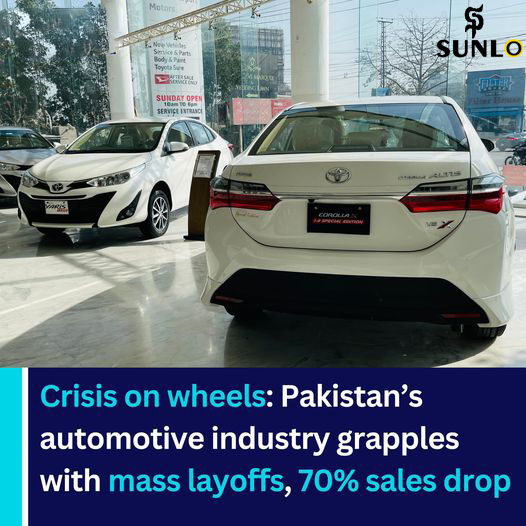Thousands of people were laid off as a result of a fall in the sales of vehicles and replacement parts, severely harming Pakistan’s automotive sector. The industry has experienced tremendous hardship as a result of the government’s ban on imports of raw materials, the rupee’s decline, and the rise in inflation. The local currency has fallen to historic lows versus the US dollar, and foreign exchange reserves are decreasing, signalling an unheard-of severity to the economic crisis.
The State Bank of Pakistan’s foreign exchange reserves have collapsed to just $4 billion, placing Pakistan in the middle of its most severe economic crisis to history. The soundness of the nation’s economy is put in question because this sum hardly covers three weeks’ worth of imports.
The prohibition on imports of raw materials, which was put in place to stop the flow of US dollars abroad, has significantly decreased industrial output and led to a large number of mass layoffs and unemployment.
Commercial banks have stopped opening letters of credit (LCs) in the middle of the deepening dollar crunch, putting importers in the dark about how they will pay for orders that have already been placed. This makes the difficulties the car sector already faces worse by making it more difficult for it to get necessary raw materials and maintain production.
Rising inflation rates, which reached 36% in April, the highest level since 1964, are a problem for the nation. As a result, consumer purchasing power has drastically decreased, which has caused a dramatic drop in automobile sales.
Munir Karim Bana, Chairman of the Pakistan Association of Automotive Parts and Accessories Manufacturers (PAAPAM), bemoans the dismal circumstances, claiming that thousands of workers have been put off and that manufacturing has ceased. The problems facing the sector have worsened as a result of the closure of auto manufacturing facilities.
While billions of rupees’ worth of raw materials are still sitting at the Karachi port, auto part manufacturers are struggling with demurrage fees. These costs are supported by PAAPAM, which is in charge of supplying about 90% of local auto parts. Additionally, income streams have dried up as production units have been shut down, adding to the industry’s financial burden.
The complete efficiency of the automotive industry might not be recovered until the IMF bailout programme is revived, according to Rana Ihsan Afzal, the prime minister Shehbaz Sharif’s coordinator for business and industry. The automotive industry is particularly susceptible to the problems facing the nation’s economy because it is a heavily dependent on imports and foreign exchange. The ninth assessment of the 2019 IMF rescue agreement was delayed, which has further hurt the prospects for the sector.

